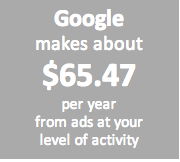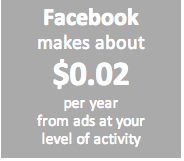Update 2016/06/03: PrivacyFix has been discontinued. Read more here.
If you are concerned with your privacy, and the way your personal data is being used online, then PrivacyFix is of interest to you.
It is available as a free extension for Chrome and Firefox (no other browsers support at this time). It scans your privacy settings for Google, Facebook and websites. It also tells you if you are tracked for ads. Most importantly, it helps you adjust those settings easily, so that your online actions are more private.
Do not make the mistake to consider PrivacyFix some sort of rebel initiative, though, that is against companies like Facebook and Google making money from your actions per se:
We’re sensitive to the need of Facebook and Google to manage their privacy frameworks, and for them to ensure that decisions are being made by directly by users. We also believe that it’s worth your time to consider each setting and any tradeoffs between privacy and functionality. We will focus your attention on the most private settings, but ultimately it’s up to you to choose the settings that work best for you.
As in: if you want to use this product (Google, Facebook) to your advantage for free, make sure you pay attention and understand what it is that you are giving up in return. Makes sense.
Nice touch
A nice touch is the calculation of how much money these companies make from your online activity. These are estimates, but nevertheless appear quite right. In my case, Facebook only makes about $0,02 per year, while Google makes $65,47 per year. Not a very high price to pay for all that information at my fingertips.

